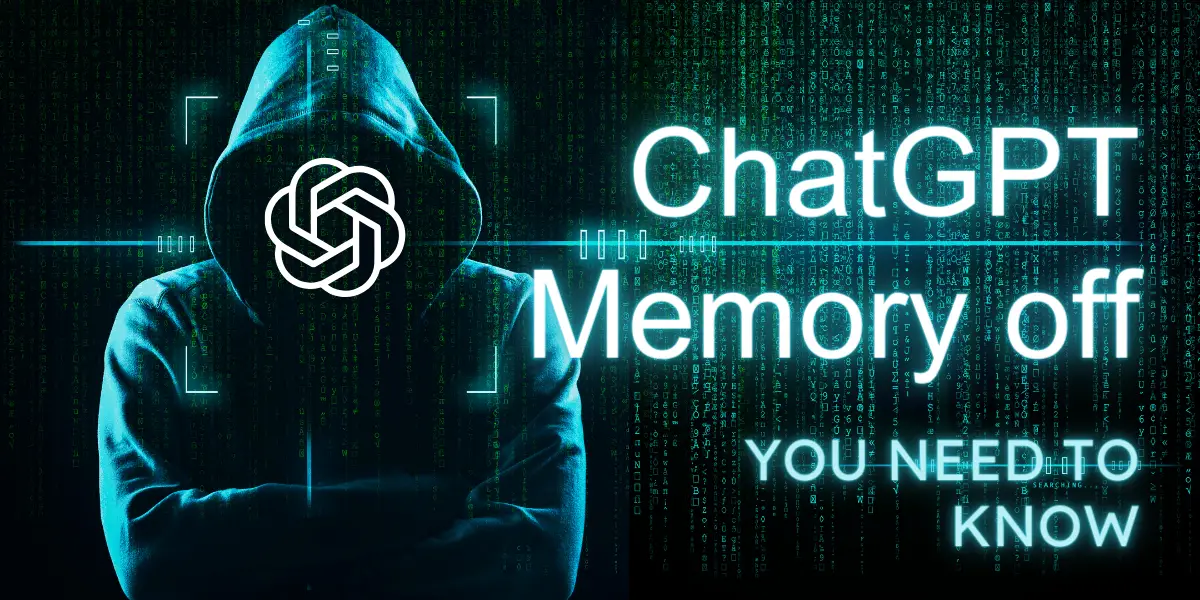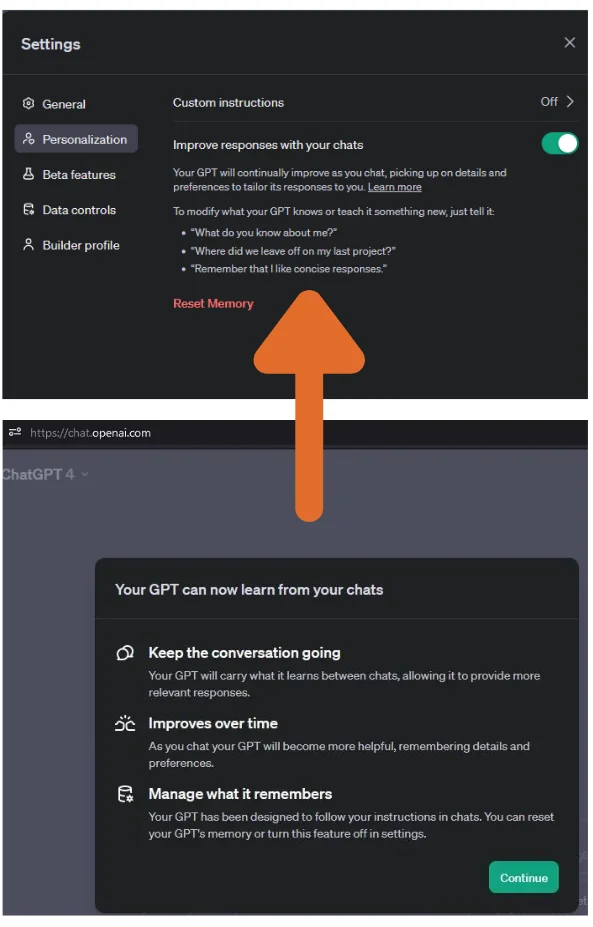ChatGPT Memory off?You Need to Know

In the ever-evolving world of AI, ChatGPT continues to make headlines. Recently, a buzz has been created around the new ‘Memory Off’ feature of ChatGPT. Let’s delve into what this feature entails and why it’s garnering attention.
Explore the new ‘Memory Off’ feature in ChatGPT, understand its implications, and discover how it affects user interactions and privacy in the AI world.
Table of Contents
What is ChatGPT Memory off?
ChatGPT‘s ‘Memory Off’ feature appears to be a new update that allows the AI to ‘remember’ conversations over time, ostensibly to improve its responses and interactions. This feature seems to be a significant shift from the traditional model where each ChatGPT session is independent, with no memory of past interactions to ensure user privacy and confidentiality. However, there seems to be some confusion and inconsistency regarding the implementation of this feature, as some users report seeing the option in their settings, while others do not.

Why ChatGPT Memory off?
The introduction of a memory feature in ChatGPT raises questions about its purpose and implications. On one hand, the ability to remember past interactions could lead to more personalized and contextually relevant conversations, enhancing the user experience. On the other hand, it brings up concerns about privacy and data security. The mixed reactions from the community reflect these contrasting views, with some excited about the potential improvements and others wary of the privacy implications.
How to turn off the ChatGPT Memory off function?
Step 1: Accessing the Settings
To manage the ‘Memory Off’ feature, users would typically need to access the settings in their ChatGPT interface. This would involve navigating to the personalization or privacy section where such options are usually listed.
Step 2: Locating the Memory Feature
Once in the settings, users should look for the ‘Memory Off’ option or a similar feature that controls ChatGPT’s ability to remember past conversations. The availability of this feature might vary based on the user’s account or the specific version of ChatGPT they are using.
Step 3: Toggling the Feature
If the ‘Memory Off’ feature is available, users can toggle it on or off based on their preference. Turning it off would mean ChatGPT will not retain information from past interactions, aligning with the traditional model of user privacy and data security.
Community Feedback
The community’s response to the ‘Memory Off’ feature has been mixed. While some users are intrigued by the potential for more coherent and context-aware conversations, others express concerns about privacy and the ethical implications of an AI remembering personal conversations. This feedback highlights the delicate balance between technological advancement and user privacy, a recurring theme in the development of AI applications.
Why is ChatGPT becoming more stupid?
Perception of Reduced Intelligence
Some users perceive ChatGPT as becoming ‘more stupid’ or less effective, possibly due to inconsistencies in its responses or the lack of context retention in conversations. This perception could be attributed to the AI’s current limitations in understanding complex contexts or maintaining coherence over extended interactions.
Challenges in Implementing Memory Features
Implementing a memory feature in AI like ChatGPT is fraught with challenges, both technical and ethical. Balancing the need for context-aware responses with privacy concerns is a complex task that may lead to perceived shortcomings in the AI’s performance.
User Expectations vs. AI Capabilities
The gap between user expectations and ChatGPT’s actual capabilities could also contribute to the perception of reduced intelligence. As users become more familiar with AI, their expectations for sophisticated interactions increase, sometimes beyond what the AI is currently capable of delivering.
ChatGPT Alternatives
1. Chatsonic (Writesonic)
What It Is: Chatsonic, developed by Writesonic, is an AI tool similar to ChatGPT but enhanced for writing tasks. It incorporates GPT-4 capabilities, making it a powerful conversational AI with advanced Natural Language Processing (NLP) and Machine Learning (ML) technologies.
Key Features:
- Customizable and User-Friendly: Offers easy-to-use features that can be customized to suit various writing needs.
- Incorporates Current Events: Unique ability to include current events and trending information through Google search training, making it highly relevant and up-to-date.
Differences from ChatGPT: Unlike ChatGPT, Chatsonic focuses more on writing tasks and can integrate real-time information, offering a more dynamic and current content generation experience.
2. Claude
What It Is: Claude is a next-generation conversational AI developed by Anthropic. It is designed to be a harmless, helpful, and honest AI system.
Key Features:
- Multiple Inputs and Behaviors: Capable of taking multiple inputs simultaneously and allows users to switch between different behaviors, personalities, and tones.
- Versatile Usage: Suitable for creative writing, coding, and answering questions, making it a versatile tool for various applications.
Differences from ChatGPT: Claude stands out with its emphasis on safety and ethical AI design, offering a user experience that is tailored to be more engaging and less prone to harmful outputs.
3. Jasper Chat
What It Is: Jasper Chat is an AI tool that excels in carrying out natural conversations. It is known for its robust AI features and enterprise-level security certifications.
Key Features:
- Idea Generation and Content Revision: Generates ideas, revises content, and can even infuse humor into conversations.
- Multilingual Support: Supports multiple languages and remembers chats for better context in conversations.
- Factual Content Generation: Generates content based on knowledge from billions of informative sources.
Differences from ChatGPT: Jasper Chat is distinguished by its ability to remember past chats for context, support for multiple languages, and a focus on generating factual content, making it ideal for complex discussions.
Each of these alternatives to ChatGPT offers unique features and capabilities, catering to different needs in the realm of AI-driven conversation and content creation. Whether it’s enhanced writing assistance, ethical AI interactions, or multilingual support, these tools provide diverse options for users looking for advanced AI chatbot experiences.
Concluding Thoughts
The ‘Memory Off’ feature in ChatGPT marks a significant development in the realm of AI chatbots. While it opens up possibilities for more advanced interactions, it also brings to the forefront important discussions about privacy and the ethical use of AI. As the technology continues to evolve, it will be crucial to find a balance that respects user privacy while enhancing the AI experience.

